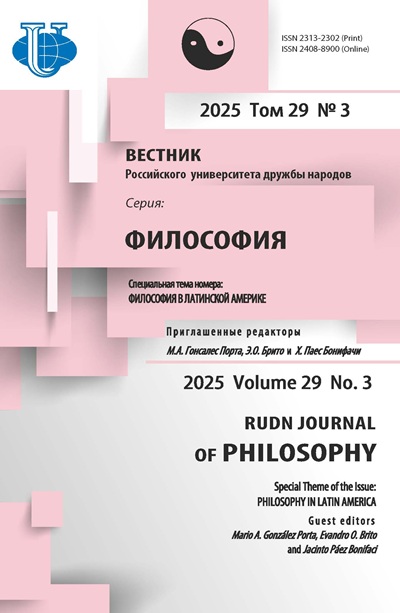Теолого-политическая идея современного салафизма у Анвара аль-Джунди
- Авторы: Аль-Джанаби М.М.1
-
Учреждения:
- Российский университет дружбы народов
- Выпуск: Том 24, № 1 (2020): ИСЛАМСКАЯ ФИЛОСОФИЯ
- Страницы: 55-63
- Раздел: ИСЛАМСКАЯ ФИЛОСОФИЯ
- URL: https://journals.rudn.ru/philosophy/article/view/23091
- DOI: https://doi.org/10.22363/2313-2302-2020-24-1-55-63
- ID: 23091
Цитировать
Полный текст
Аннотация
Основная идея данного исследования состоит в том, чтобы раскрыть содержание теолого-политической идей современного салафизма идеологии «Братьев мусульман» на примере творчества Анвара аль-Джунди (1917-2002). Основной вопрос, который занимает Анвара аль-Джунди во всех его произведениях, касается того, как мусульмане могут сохранить свою исламскую идентичность. Отсюда - идея аль-Джунди о первостепенной значимости «оптимизации исламского возрождения и пробуждения», которая связана с тем, что он называет «закатом западной цивилизации и рассветом исламской альтернативы». Важное место в понимании и сохранении исламской идентичности у него занимает теория «политического заговора» Запада по отношению к мусульманскому миру. Этим предопределяется политическое видение Анвара аль-Джунди, для которого вся история взаимоотношений Запада с исламским миром и исламом - это звенья в цепи явного и скрытного заговора. В совокупном подходе Анвара аль-Джунди преобладает теологическое видение и менталитет, сводящие действительность к выборке, обосновывающей догмы религии и веры. В результате неизбежно возникает политическое видение именно такого типа. У Анвара аль-Джунди оно принимает облик методологии критики и обоснования культурных и цивилизационных параметров политической идеи. Его метод в отдельных аспектах не лишен научного подхода и содержит глубокие критические замечания, однако остается в рамках все тех же традиций богословского педантизма, который превращает науку, историю и размышление в инструменты обслуживания религиозных догм.
Ключевые слова
Об авторах
Матем Мухаммед Аль-Джанаби
Российский университет дружбы народов
Автор, ответственный за переписку.
Email: al-dzhanabi-mm@rudn.ru
доктор философских наук, профессор кафедры истории философии факультета гуманитарных и социальных наук
ул. Миклухо-Маклая, 6, Москва, Российская Федерация, 117198Список литературы
- Анвар аль-Джунди. Как мусульманам сохранить исламскую идентичность. «Дар аль-Итисам», Каир, (б.г.).
- Анвар аль-Джунди. Препятствия на пути возрождения. «Дар аль-Итисам», Каир, (б.г.).
- Анвар аль-Джунди. Исламский мир и политическая, социальная и культурная колонизация. «Дар аль-Китаб аль-Любнаний», Бейрут, 2-е изд., 1983.
- Анвар аль-Джунди. Колониализм и ислам. «Дар аль-Ансар». Каир, (б.г.).
- Анвар аль-Джунди. Сионизм и ислам. «Дар аль-Ансар». Каир, (б.г.).
- Анвар аль-Джунди. Как мусульманам разорвать цепи зависимости и блокады. «Муассасат аль-Кутуб ас-Салафийя», Каир, 1985.
- Анвар аль-Джунди. Пересмотр писаний наших современников в свете ислама. «Дар аль-Итисам», Каир, (б.г.).
- Анвар аль-Джунди. Султан Абдул-Гамид. «Дар Ибн Айдун». Бейрут; «Аль-Мактаба ас-Салафийя», Каир, 1407 г.х.,
- Анвар аль-Джунди. Светлые страницы из наследия ислама. «Дар аль-Итисам», Каир, (б.г.).
- Анвар аль-Джунди. Исламский призыв в пятнадцатом веке хиджры. «Дар альАнсар», Каир, (б.г.).
- Аль-Джанаби М.М. Исламская парадигма многообразия политической идеи: история и современность // «Рассыпанное» и «собранное»: когнитивные приемы арабомусульманской культуры. М. : ООО «Садра»: Издательский Дом ЯСК, 2017.
- Аль-Джанаби М.М. Политическая идея современного исламоцентризма // Исламские радикальные движения на политической карте мира. М. : Изд. URSS, 2015.
- Аль-Джанаби М.М. Исторические прототипы современных исламских политических движений // ASIATICA. Санкт-Петебург. 2018. Выпуск 12 (2).
- Ерасов Б.С. Социально-культурные традиции и общественное сознание в развивающихся странах Азии и Африки. М. : Наука, 1982.
- Esposito J.L. Voices of Resurgent Islam. Oxford University Press, 1983.
Дополнительные файлы















